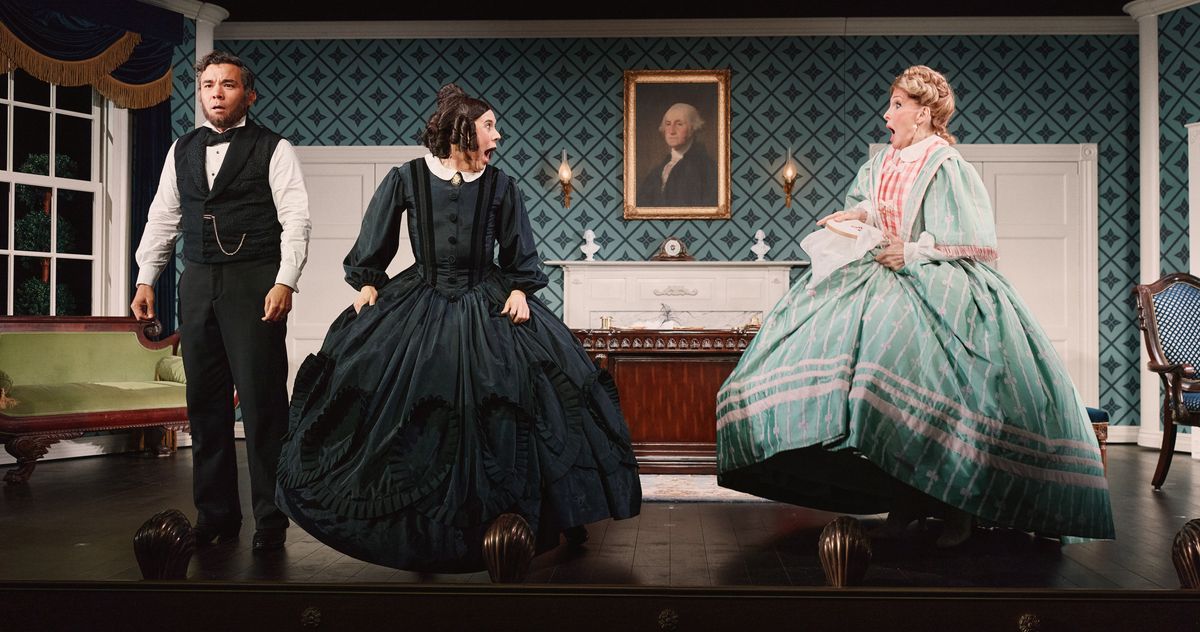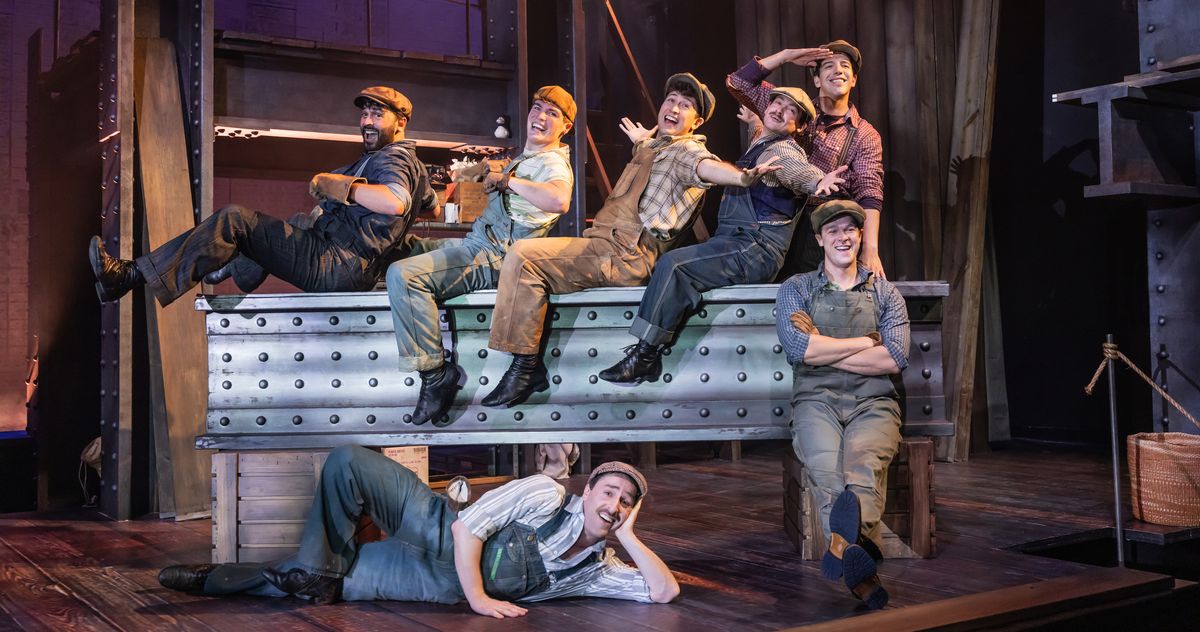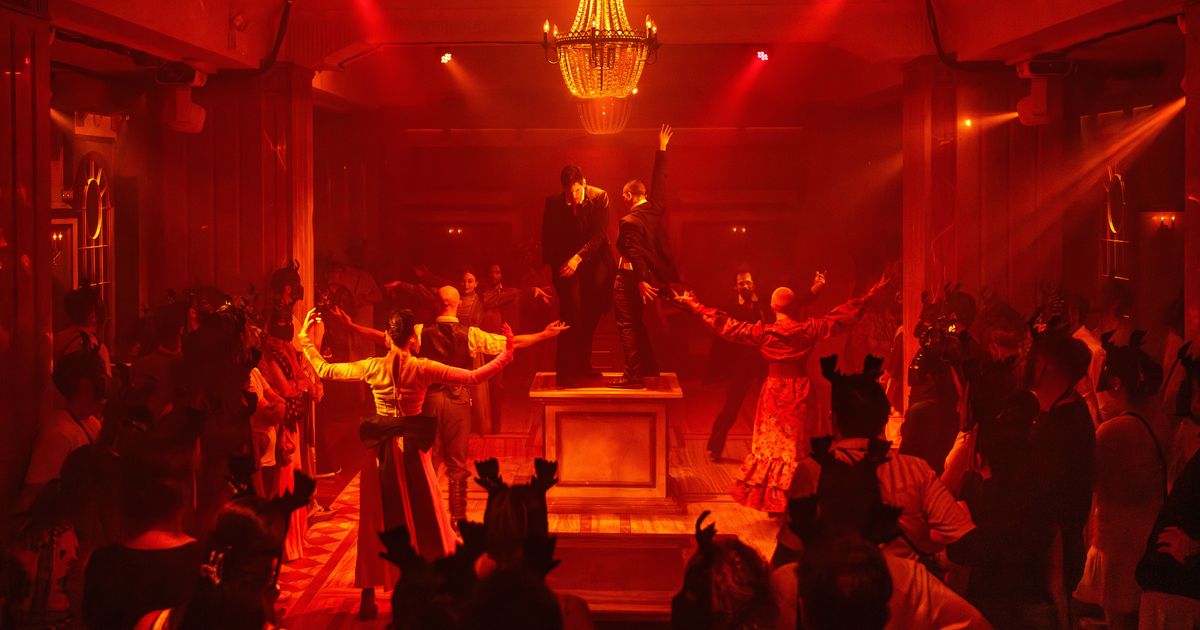Sean Bell and Kate Mulgrew in The Beacon.
Photo: Carol Rosegg
Something is rotten in a little house on an island off the Irish coast. Beiv (Kate Mulgrew), a painter of throbbing abstract canvases famous for their “brutal” and “feminist” interpretations, is welcoming her son Colm (Zach Appelman) back to the family cottage, along with his new, and very young, American bride, Bonnie (Ayana Workman). But why has Beiv embarked on a full-scale renovation of the house, replacing most of its walls with glass? Whence the weird currents of electricity passing between Colm and Donal (Sean Bell), an old family friend currently at work relaying Beiv’s patio? Why is a local true crime podcaster (David Mattar Merten) interested in the death of Biev’s ex-husband? And what could it possibly mean that the painter calls her most recent series of raw, inferno-like whorls “Guilt”?
If you heard a “dun dun DUN” in your head after reading all of that, you’re not too far off from the tone of Nancy Harris’s The Beacon, now receiving its stateside premiere at the Irish Rep. Harris’s play is only five years old—it was commissioned by Galway’s Druid Theatre where it first appeared in 2019—but it belongs to a venerable strain of theater-making with a whole slew of aunts, uncles, and cousins. Ibsen’s in the family tree, and O’Neill; so are Tracy Letts and Branden Jacobs-Jenkins. And what a family: Ghosts and estrangements, catastrophic reunions, closets full of bones, blood under the carpet and cracks in the plaster — houses, in short, that will not stand. The issue with new attempts at stories like these is that they’re a bit like Black Forest cake: ripe and risky. It’s possible to do them well—or to reinvent the recipe, as Jacobs-Jenkins does so effectively—but present a middling version, overbaked or with too much icing, and Paul and Prue are going to tell you that it feels a bit gauche. “Jesus,” moans Colm at his mother, “Always with the melodrama.” The word need not be derogatory, but in The Beacon’s case there’s no help for it.
Like Beiv, Harris paints with a broad, overloaded brush. “I love that giant sculpture of your tampon,” Bonnie gushes to her unimpressed mother-in-law — because what would a “great feminist artist” be without towering reproductions of menstrual products and a set of prints known as her “womb series”? The Beacon’s conversations about art—in which Colm, a tech bro, plays the cynical antagonist—land with a series of easy thuds. At the same time, characters keep lugging out Symbols: “She’ll basically be living in a glass box,” Colm gripes about his mother’s renovations; then, later, “[Bonnie’s] looking for a beacon,” Beiv tells her son in a brazen title drop. “Someone to rescue her from the dark ocean of her life and give it some shape, cos she doesn’t know what to make of it.” The same could be said of almost everyone in Harris’s play — except Beiv, who has a North Star in her art despite the scorpions in her mind. Bonnie, Colm, and Donal, meanwhile, are all thrashing about in whirlpools of their own delusion and desperation, and each has fixated on the wrong savior. It’s not that Harris shouldn’t attempt to spin an emotional throughline out of her titular image, but in so blatantly calling our attention to it, the whole construction falls flat. One can’t be moved, or even really engaged, when a writer keeps saying, “See what I did there?”
A director could help to offset this heavy-handedness somewhat, but Marc Atkinson Borrull only doubles down. He’s got Mulgrew—who was in her element as Star Trek: Voyager’s Captain Janeway and Orange Is the New Black’s iron-lady prison chef—waxing distractingly histrionic on the Irish Rep’s small stage, sticking her entrances and delivering mistily sinister speeches into the middle distance like she’s auditioning for a remake of Clue. Which would be fun if there were even a hint of camp about The Beacon. There is not. We’re meant to laugh at Beiv’s dry zingers (“It’s a blood orange” she tosses off after Bonnie offers a rhapsodic appraisal of one of her paintings as a representation of “pretty much all female suffering”) but not at the play’s interludes of high seriousness, of which there are many, almost all too flimsy to support their own demands for a straight face.
As the two men navigating a boyhood love affair that left one out, wounded, and still smitten, and the other cold and closeted (or unconvincingly bi-), Bell and Appelman fare better. Especially together, they’re able to generate some of the production’s most affecting moments, working both through and around the text simply to be present with each other. Workman, by contrast, is doing her best in a thankless role (jokes about American obnoxiousness and ditziness: check), but she feels hemmed in by a script full of stereotypes and a director who wants everything at eleven. There’s also something too purely ingénue-ish about what Borrull has her doing: She’s sweet and bright, but what little dimension the character has calls for more edge — a rebellious, rock-band-groupie streak that would make Biev’s “dark ocean of her life” assessment ring more true, if not more elegant. (On the other hand, we’re not really in the business of making sense here: Why someone with Bonnie’s yearnings would take up with a literal-minded sourpuss app guy, even a cute Irish one, is its own underexplored question.)
Though there is in fact one more character in The Beacon, it’s the type of part where an actor spends all but ten minutes backstage. As Ray, the podcaster who’d like to dig up Biev’s various skeletons, Merten shows up late in the game for only a single scene, but at the end of that scene his exit provides an unexpected visual microcosm for The Beacon as a whole. Threatened by Donal, Ray hightails it out of the painter’s cottage, in the process executing a weirdly amusing and entirely unnecessary leap over a chair. Over-the-top? Definitely. Supposed to be funny? Unlikely. Harris’s glass house by the sea is certainly tottering, but its unsteadiness isn’t a matter of earned sturm und drang, but of its own architecture.
The Beacon is at the Irish Repertory Theatre through November 3.












